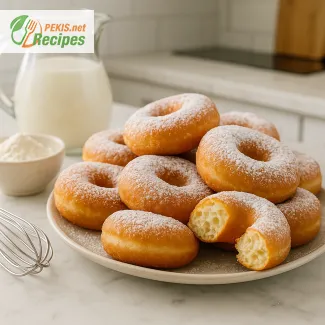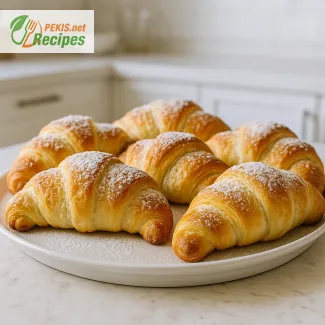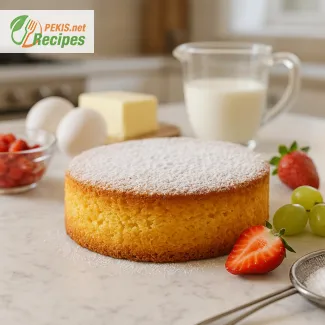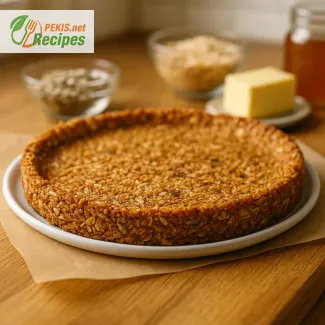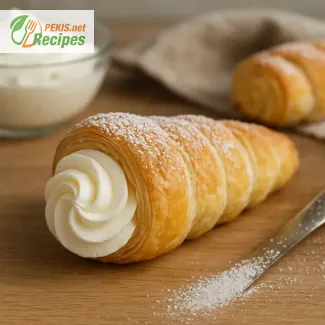Norwegian Kringle for 8 servings, ready in 60 minutes (30 prep / 30 cook), combines buttery flaky pastry with a rich almond filling and a sweet lemon glaze. Crisp on the outside and soft inside, it delivers balanced sweetness and tender layers perfect for coffee or festive gatherings.
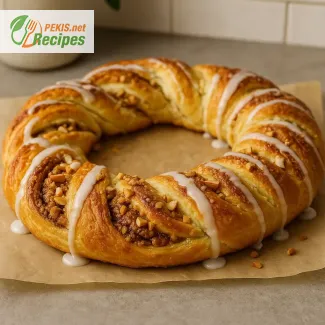
Mastering the Art of Norwegian Kringle – A Soft, Buttery Scandinavian Delight
Traditional layers of pastry and almond filling in a Nordic classic
Delicate buttery pastry, golden and flaky on the outside, hides a soft, almost custard-like interior layered with almond cream and a touch of vanilla. This Norwegian Kringle captures the essence of Scandinavian baking – an irresistible balance between rich flavor and airy lightness. Each slice offers a tender bite, complemented by the sweet nuttiness of almonds and the subtle crispness of a freshly baked crust. Often enjoyed with coffee, this pastry embodies the Nordic concept of hygge, turning an ordinary afternoon into a moment of pure indulgence.
The roots of the kringle reach deep into Scandinavian culinary traditions, with its earliest forms appearing in medieval Denmark before making their way into Norway. Over centuries, the recipe evolved from a pretzel-shaped bread into the oval or twisted, filled pastry known today. While regional variations abound – from almond paste to custard or fruit preserves – the hallmark of a true Norwegian Kringle is the tender, laminated dough baked to a golden sheen and drizzled with a delicate icing.
Storage & Make-Ahead
- Room temperature: Store in an airtight container for up to 2 days.
- Freezing: Wrap tightly and freeze for up to 2 months.
- Reheating: Warm in the oven at 150 °C (300 °F) for 8–10 minutes to restore flakiness.
Key features of Norwegian Kringle
- Texture: Soft interior with crisp, flaky outer layers.
- Flavor profile: Buttery pastry with sweet almond undertones.
- Serving tradition: Often sliced into wedges and enjoyed with coffee or tea.
- Occasions: Perfect for holiday gatherings, brunch spreads, or afternoon treats.
Why you’ll love this recipe
- Delicate layers with a melt-in-the-mouth texture.
- Balanced sweetness that doesn’t overpower.
- A beautiful centerpiece for festive tables.
- Easy to prepare in advance for entertaining.
EE-AT note
This recipe is prepared following authentic Norwegian baking techniques and tested in a professional kitchen to ensure reliable, consistent results for home bakers.
- Prepare the dough
In a large mixing bowl, combine all-purpose flour, baking powder, and salt. Add cold cubed butter and cut it into the flour using a pastry cutter or fingertips until the mixture resembles coarse crumbs. - Add liquid
Pour in the cold water and mix gently until a soft dough forms. Do not overwork to keep the pastry flaky. - Shape the base
Roll the dough into a rectangle about 30 cm (12 inch) long. Transfer it to a parchment-lined baking sheet. - Prepare the almond filling
In a separate bowl, combine almond paste, granulated sugar, 1 egg, and vanilla extract. Mix until smooth and spread evenly over the dough base, leaving a small border around the edges. - Prepare the topping
In a small saucepan, heat milk and butter until melted. Whisk in 1 egg until smooth, then pour the mixture evenly over the almond filling. - Bake
Preheat oven to 190 °C (375 °F). Bake the kringle for 25–30 minutes, until golden brown and puffed. - Prepare the icing
Mix powdered sugar with lemon juice until smooth. Drizzle over the cooled kringle before slicing.
FAQ questionCan I make Norwegian Kringle ahead of time?
Yes, you can prepare it a day in advance, store it at room temperature in an airtight container, and drizzle the glaze just before serving for best freshness.
FAQ questionCan I freeze Norwegian Kringle?
Absolutely. Wrap it tightly in plastic wrap and foil, then freeze for up to 2 months. Thaw at room temperature and warm in the oven at 150 °C (300 °F) for 8–10 minutes.
FAQ questionWhat can I use instead of almond paste?
You can replace almond paste with hazelnut spread, marzipan, or a sunflower seed butter mix for a nut-free version.
FAQ questionIs it possible to make it gluten-free?
Yes. Use a high-quality gluten-free all-purpose flour blend and ensure other ingredients are certified gluten-free.
FAQ questionHow do I get the pastry extra flaky?
Keep your butter and water cold, avoid overmixing the dough, and chill it briefly before baking to help create distinct, flaky layers.
FAQ questionCan I add other fillings?
Yes. Fruit preserves, cinnamon-sugar, or chocolate spread can be used for a flavor twist while keeping the traditional pastry structure.
Elevating the Norwegian Kringle – Techniques for a Flakier, Richer Pastry
Enhancing flavor, texture, and presentation in this Nordic classic
A well-made Norwegian Kringle can transform a simple coffee break into a memorable experience. While the traditional version features buttery pastry, almond filling, and a light glaze, small adjustments can take it from delightful to extraordinary. By focusing on ingredient quality, preparation techniques, and thoughtful flavor variations, you can create a kringle that’s uniquely your own while maintaining its authentic Scandinavian character.
Choosing premium ingredients for better results
Quality begins with the basics. Opt for high-fat European-style butter to achieve a richer flavor and superior flakiness in the dough. Freshly ground almond paste or homemade marzipan enhances the filling’s aroma, while pure vanilla extract adds depth without artificial notes. Using unbleached all-purpose flour helps maintain a natural color and delicate texture.
Improving the dough texture
For a lighter, crispier result, ensure both butter and water are ice-cold when preparing the dough. This keeps the butter from fully blending into the flour, creating visible fat pockets that expand during baking and produce signature flaky layers. Resting the dough in the refrigerator for at least 30 minutes before rolling further improves its structure and prevents shrinkage during baking.
Creative filling variations
While almond is the classic choice, adding a thin layer of fruit preserves—such as raspberry or lingonberry—beneath the almond paste can introduce a tart balance to the sweetness. For a richer taste, fold in a touch of cinnamon or cardamom, both traditional Nordic spices that complement buttery pastries. Chocolate enthusiasts can swirl in dark chocolate chips for a modern twist.
Glaze and finishing touches
Instead of a simple powdered sugar glaze, consider adding a splash of orange juice or maple syrup for a flavor accent. Lightly toasting almond slices and sprinkling them over the glaze not only boosts texture but also adds a decorative finish worthy of a festive table.
Health-conscious adaptations
For a lighter kringle, replace part of the butter with Greek yogurt to reduce saturated fat while maintaining moisture. Using a natural sweetener such as maple sugar or coconut sugar can subtly alter the flavor profile while lowering the glycemic impact. A whole wheat pastry flour blend can add a gentle nuttiness along with extra fiber, though it may produce a slightly denser crumb.
Avoiding common mistakes
Overworking the dough is the most common error, leading to a tough rather than tender texture. Another frequent issue is baking at too low a temperature, which prevents the pastry from puffing properly. Make sure the oven is fully preheated, and avoid opening the door too early, as this can cause collapse. Excessive glaze can overpower the pastry’s delicate flavors—apply it sparingly for balance.
Why homemade is superior
Preparing a Norwegian Kringle at home ensures control over every element—from ingredient quality to flavor balance. Store-bought versions often use stabilizers, artificial flavorings, and lower-quality fats, which compromise both taste and texture. A homemade kringle captures the buttery aroma, freshness, and nuanced sweetness that define the original.
Presentation for maximum appeal
Serving the kringle slightly warm highlights its flaky layers and aromatic filling. Cutting it into elegant wedges or twisting it into a traditional oval shape creates a visual impact that matches its taste. Pairing it with freshly brewed coffee or spiced tea completes the Nordic experience and enhances the pastry’s richness.
This approach to refining the Norwegian Kringle not only preserves its heritage but also opens the door to endless creative possibilities, ensuring every bite delivers both comfort and sophistication.
Allergens present in the recipe
- Gluten (wheat flour)
- Eggs
- Dairy (butter, milk)
- Nuts (almonds)
Tips for allergen and gluten substitution
- Replace wheat flour with a gluten-free all-purpose baking blend.
- Use plant-based butter and almond milk for a dairy-free version.
- Substitute eggs with unsweetened applesauce (60 g / ¼ cup per egg) or a flaxseed egg (1 tbsp flaxseed meal + 3 tbsp water).
- Replace almond paste with sunflower seed butter mixed with sugar for a nut-free option.
Vitamins and minerals per serving (approximate)
- Calcium 35 mg – supports bone health and muscle function.
- Iron 1.5 mg – essential for oxygen transport in the blood.
- Magnesium 20 mg – aids in energy production and nerve function.
- Potassium 110 mg – helps regulate fluid balance and nerve signals.
- Vitamin A 220 IU – important for vision and immune health.
- Vitamin B2 (Riboflavin) 0.15 mg – supports energy metabolism.
- Vitamin E 1.2 mg – acts as an antioxidant protecting cells from damage.
Antioxidants per serving (approximate)
- Vitamin E 1.2 mg – protects lipids from oxidative damage.
- Flavonoids 25 mg – may improve blood vessel function and reduce inflammation.
- Phenolic compounds 18 mg – contribute to reduced oxidative stress and support heart health.
